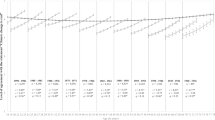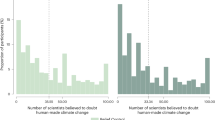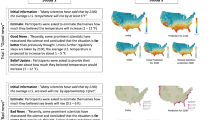Abstract
In this paper, we address the chicken-or-egg question posed by two alternative explanations for the relationship between perceived personal experience of global warming and belief certainty that global warming is happening: Do observable climate impacts create opportunities for people to become more certain of the reality of global warming, or does prior belief certainty shape people’s perceptions of impacts through a process of motivated reasoning1? We use data from a nationally representative sample of Americans surveyed first in 2008 and again in 2011; these longitudinal data allow us to evaluate the causal relationships between belief certainty and perceived experience, assessing the impact of each on the other over time2. Among the full survey sample, we found that both processes occurred: ‘experiential learning’, where perceived personal experience of global warming led to increased belief certainty, and ‘motivated reasoning’, where high belief certainty influenced perceptions of personal experience. We then tested and confirmed the hypothesis that motivated reasoning occurs primarily among people who are already highly engaged in the issue whereas experiential learning occurs primarily among people who are less engaged in the issue, which is particularly important given that approximately 75% of American adults currently have low levels of engagement3,4.
This is a preview of subscription content, access via your institution
Access options
Subscribe to this journal
Receive 12 print issues and online access
$209.00 per year
only $17.42 per issue
Buy this article
- Purchase on Springer Link
- Instant access to full article PDF
Prices may be subject to local taxes which are calculated during checkout

Similar content being viewed by others
References
Akerlof, K., Maibach, W. W., Fitzgerald, D., Cedeno, A. Y. & Neuman, A. Do people ‘personally experience’ global warming, and if so how, and does it matter? Glob. Env. Change http://dx.doi.org/10.1016/j.gloenvcha.2012.07.006 (in the press).
Bullock, H. E., Harlow, L. L. & Mulaik, S. A. Causation issues in structural equation modeling research. Struct. Equ. Modeling 13, 253–267.
Maibach, E., Leiserowitz, A., Roser-Renouf, C. & Mertz, C. K. Identifying like-minded audiences for global warming public engagement campaigns: An audience segmentation analysis and tool development. PLoS ONE 6, e17571 (2011).
Leiserowitz, A., Maibach, E., Roser-Renouf, C. & Hmielowski, J. Global Warming’s Six Americas, March 2012 & Nov. 2011 (Yale Project on Climate Change Communication, 2012).
Karl, T. R., Melillo, J. M. & Peterson, T. C. (eds) Global Climate Change Impacts in the United States (Cambridge Univ. Press, 2009).
Leiserowitz, A. American risk perceptions: Is climate change dangerous? Risk Anal. 25, 1433–1442 (2005).
Anderegg, W. R. L., Prall, J. W., Harold, J. & Schneider, S. H. Expert credibility in climate change. Proc. Natl Acad. Sci. USA 107, 12107–12109 (2010).
Roser-Renouf, C., Maibach, E., Leiserowitz, A. & Zhao, X. The Genesis of Climate Change Activism: From Key Beliefs to Political Advocacy Int. Commun. Assoc. Annual Conference (2011).
Weber, E. U. & Stern, P. C. Public understanding of climate change in the United States. Am. Psychologist 66, 315–328 (2011).
Fiske, S. T. & Taylor, S. E. Social Cognition 2nd edn (McGraw-Hill, 1991).
Miller, J. D. Public understanding of, and attitudes toward, scientific research: What we know and what we need to know. Public Underst. Sci. 13, 273–294 (2004).
Marx, S.M. et al. Communication and mental processes: Experiential and analytic processing of uncertain climate information. Glob. Environ. Change 17, 47–58 (2007).
Lejarraga, T. When experience is better than description: Time delays and complexity. J. Behav. Decis. Making 23, 100–116 (2010).
Leiserowitz, A. Climate change risk perception and policy preferences: The role of affect, imagery, and values. Climatic Change 77, 45–72 (2006).
Weber, E. U. What shapes perceptions of climate change? WIREs Clim. Change 1, 332–342 (2010).
Brody, S. D., Zahran, S., Vedlitz, A. & Grover, H. Examining the relationship between physical vulnerability and public perceptions of global climate change in the United States. Env. Behav. 40, 72–95 (2008).
Spence, A., Poortinga, W., Butler, C. & Pidgeon, N. S. Perceptions of climate change and willingness to save energy related to flood experience. Nature Clim. Change 1, 46–49 (2011).
Leiserowitz, A. & Broad, K. Florida: Public Opinion on Climate Change (Yale Project on Climate Change, 2008).
Kahan, D. M. et al. The Tragedy of the Risk-Perception Commons: Culture Conflict, Rationality Conflict, and Climate Change Temple University Legal Studies Research Paper No. 2011-26 (2011); available at http://dx.doi.org/10.2139/ssrn.1871503 (2011).
El-Gamal, M. A. & Grether, D. M. Are people Bayesian? Uncovering behavioral strategies. J. Am. Stat. Assoc. 90, 1137–1145 (1995).
Kunda, Z. The case for motivated reasoning. Psychol. Bull. 3, 480–498 (1990).
Dawson, E., Gilovich, T. & Regan, D. T. Motivated reasoning and performance on the Wason selection task. Pers. Soc. Psychol. Bull. 28, 1379–1387 (2002).
Hart, P. S. & Nisbet, E. C. Boomerang effects in science communication: How motivated reasoning and identity cues amplify opinion polarization about climate mitigation policies. Commun. Res. 39, 701–723 (2011).
Taber, C. S. & Lodge, M. Motivated skepticism in the evaluation of political beliefs. Am. J. Polit. Sci. 50, 755–769 (2006).
Leiserowitz, A., Maibach, E., Roser-Renouf, C., Smith, N. & Dawson, E. Climategate, public opinion, and the loss of trust. (in the press); accessed July 23, 2012 from http://www.climatechangecommunication.org/images/files/Climategate_PublicOpinion_andLossofTrust(1).pdf.
Weber, E. U. & Sonka, S. in Farmers’ Decision Making: A Descriptive Approach (eds Jacobsen, B. H., Pedersen, D. E., Christensen, J. & Rasmussen, S.) 201–218 (SJFI, 1994).
Ruddell, D., Harlan, S. L., Grossman-Clarke, S. & Chowell, G. Scales of perception: Public awareness of regional and neighborhood climates. Climatic Change 3, 1–27 (2011).
Kline, R. B. Principles and Practice of Structural Equation Modeling 3rd edn (The Guilford Press, 2010).
Maibach, E. W., Nisbet, M., Baldwin, P. & Diao, G. Reframing climate change as a public health issue: An exploratory study of public reactions. BMC Public Health 10, 1–11 (2010).
Myers, T.A., Nisbet, M.C., Maibach, E. W. & Leiserowitz, A. A public health frame arouses hopeful emotions about climate change: A letter. Climatic Change 113, 1105–1112 (2012).
Callegaro, M. & DiSogra, C. Computing response metrics for online panels. Public Opin. Quart. 72, 1008–1032 (2008).
Lorenzoni, I., Nicholson-Cole, S. & Whitmarsh, L. Barriers perceived to engaging with climate change among the UK public and their policy implications. Glob. Env. Change 17, 445–459 (2007).
Acknowledgements
This study was supported by the Grantham Foundation for the Protection of the Environment, the Surdna Foundation, the 11th Hour Project, the V. Kann Rasmussen Foundation, and a Health Policy Investigator Award from the Robert Wood Johnson Foundation.
Author information
Authors and Affiliations
Contributions
This study was designed by T.A.M., E.W.M., C.R-R., K.A. and A.A.L. The survey was conducted by E.W.M., C.R-R. and A.A.L.. The analysis was conducted by T.A.M. All authors contributed to the writing of the manuscript.
Corresponding author
Ethics declarations
Competing interests
The authors declare no competing financial interests.
Rights and permissions
About this article
Cite this article
Myers, T., Maibach, E., Roser-Renouf, C. et al. The relationship between personal experience and belief in the reality of global warming. Nature Clim Change 3, 343–347 (2013). https://doi.org/10.1038/nclimate1754
Received:
Accepted:
Published:
Issue Date:
DOI: https://doi.org/10.1038/nclimate1754
This article is cited by
-
Climate Change Denial and Corporate Environmental Responsibility
Journal of Business Ethics (2024)
-
Climate change beliefs and their correlates in Latin America
Nature Communications (2023)
-
Experience exceeds awareness of anthropogenic climate change in Greenland
Nature Climate Change (2023)
-
Climate change awareness, perceived impacts, and adaptation from farmers’ experience and behavior: a triple-loop review
Regional Environmental Change (2023)
-
Drought Exposure and Accuracy: Motivated Reasoning in Climate Change Beliefs
Environmental and Resource Economics (2023)



